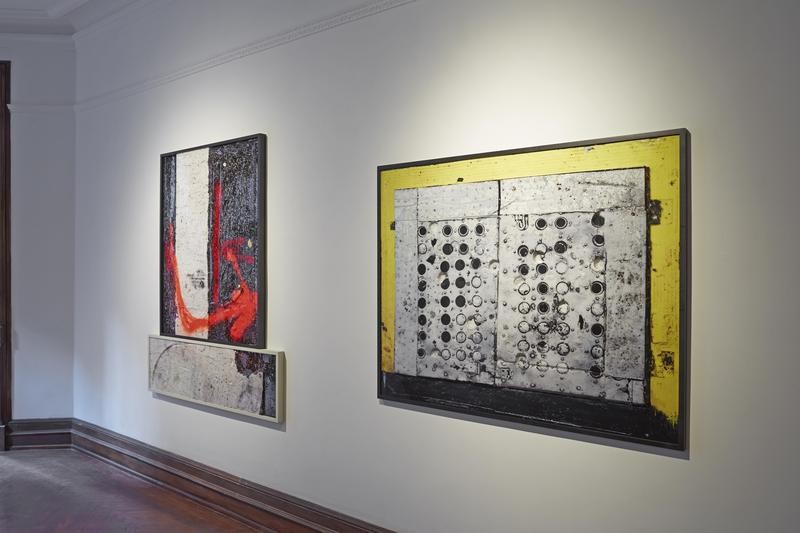Crunchy
15 Jan - 21 Feb 2015
CRUNCHY
15 January - 21 February 2015
Organized by Gregory Linn And Clayton Press
As an adjective, “crunchy” typically connotes a hard texture and/or a crisp, loud sound when something is bitten, or chewed. “Soggy,” “crunchy’s” antonym, connotes wet, usually soft, and heavily dull. According to the late economic journalist, Nico Colchester, "Crunchy systems are those in which small changes have big effects leaving those affected by them in no doubt whether they are up or down, rich or broke, winning or losing, dead or alive... (while) Sogginess is comfortable uncertainty."[1]
For this show, the organizers, – Clayton Press and Gregory Linn, – relied upon Colchester’s concept of “crunchiness” as a point of departure to challenge common expectations about how paintings are made and what they convey. Crunchy brings together a group of artists who challenge the traditional treatment of a painting's surface. It is about the materiality of material. It is about physicality and presence that confronts or defies two-dimensional conventions. It is about an idea of “visual tactility” that changes how we look at things.
· Andisheh Avini swirls and splatters silkscreen inks on readymade carpet remnants, disrupting traditional notions of painting.
· Anna Betbeze debauches woolen flokati, by burning, scarring, and throwing acid dyes and watercolors on the shag rugs.
· Heather Cook hand paints cotton yarns before warping them on the loom, making panels that are sewn together to make almost optical paintings.
· Ethan Greenbaum prints photographic images of urban grunge onto acrylic sheets, vacuum- forming and painting the material.
· Adam Henry creates fondant-like finishes using pigment-injected polymers and upends the color spectrum.
· Kathleen Jacobs wraps tree trunks with canvases, letting them age for many months before applying pigment that reveal near-mystical landscapes.
· Jutta Koether decants liquid glass, combining it with the detritus of urban street commerce.
· Jason Matthew Lee grinds through sheet metal and applies hacker programming code and personal confessions with a text-labeling gun on vinyl.
· Anthony Pearson pours pigmented hydrocal to create almost molten wall works that allude to the body and landscape.
· Michael Rey massages plasticine on alien-shaped armatures, painted in idiosyncratic colors.
· Borna Sammak experiments with embroidery and custom heat transfer decals, objectifying pop culture.
15 January - 21 February 2015
Organized by Gregory Linn And Clayton Press
As an adjective, “crunchy” typically connotes a hard texture and/or a crisp, loud sound when something is bitten, or chewed. “Soggy,” “crunchy’s” antonym, connotes wet, usually soft, and heavily dull. According to the late economic journalist, Nico Colchester, "Crunchy systems are those in which small changes have big effects leaving those affected by them in no doubt whether they are up or down, rich or broke, winning or losing, dead or alive... (while) Sogginess is comfortable uncertainty."[1]
For this show, the organizers, – Clayton Press and Gregory Linn, – relied upon Colchester’s concept of “crunchiness” as a point of departure to challenge common expectations about how paintings are made and what they convey. Crunchy brings together a group of artists who challenge the traditional treatment of a painting's surface. It is about the materiality of material. It is about physicality and presence that confronts or defies two-dimensional conventions. It is about an idea of “visual tactility” that changes how we look at things.
· Andisheh Avini swirls and splatters silkscreen inks on readymade carpet remnants, disrupting traditional notions of painting.
· Anna Betbeze debauches woolen flokati, by burning, scarring, and throwing acid dyes and watercolors on the shag rugs.
· Heather Cook hand paints cotton yarns before warping them on the loom, making panels that are sewn together to make almost optical paintings.
· Ethan Greenbaum prints photographic images of urban grunge onto acrylic sheets, vacuum- forming and painting the material.
· Adam Henry creates fondant-like finishes using pigment-injected polymers and upends the color spectrum.
· Kathleen Jacobs wraps tree trunks with canvases, letting them age for many months before applying pigment that reveal near-mystical landscapes.
· Jutta Koether decants liquid glass, combining it with the detritus of urban street commerce.
· Jason Matthew Lee grinds through sheet metal and applies hacker programming code and personal confessions with a text-labeling gun on vinyl.
· Anthony Pearson pours pigmented hydrocal to create almost molten wall works that allude to the body and landscape.
· Michael Rey massages plasticine on alien-shaped armatures, painted in idiosyncratic colors.
· Borna Sammak experiments with embroidery and custom heat transfer decals, objectifying pop culture.

